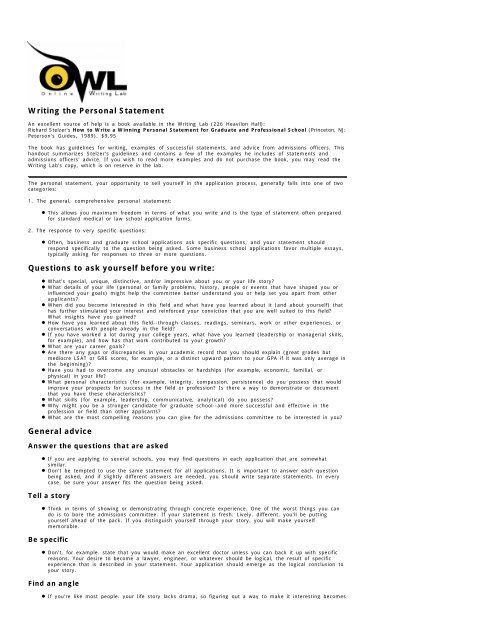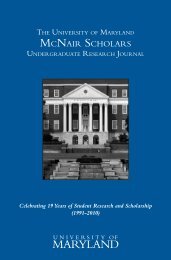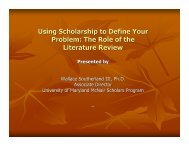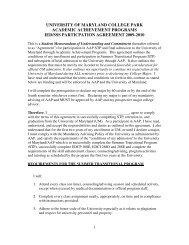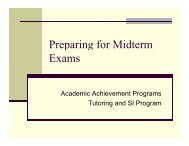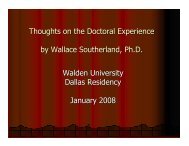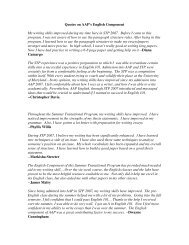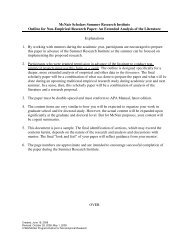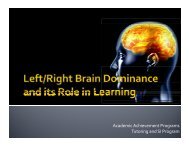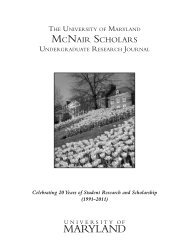Writing the Personal Statement - Academic Achievement Programs
Writing the Personal Statement - Academic Achievement Programs
Writing the Personal Statement - Academic Achievement Programs
Create successful ePaper yourself
Turn your PDF publications into a flip-book with our unique Google optimized e-Paper software.
<strong>Writing</strong> <strong>the</strong> <strong>Personal</strong> <strong>Statement</strong><br />
An excellent source of help is a book available in <strong>the</strong> <strong>Writing</strong> Lab (226 Heavilon Hall):<br />
Richard Stelzer's How to Write a Winning <strong>Personal</strong> <strong>Statement</strong> for Graduate and Professional School (Princeton, NJ:<br />
Peterson's Guides, 1989). $9.95<br />
The book has guidelines for writing, examples of successful statements, and advice from admissions officers. This<br />
handout summarizes Stelzer's guidelines and contains a few of <strong>the</strong> examples he includes of statements and<br />
admissions officers' advice. If you wish to read more examples and do not purchase <strong>the</strong> book, you may read <strong>the</strong><br />
<strong>Writing</strong> Lab's copy, which is on reserve in <strong>the</strong> lab.<br />
The personal statement, your opportunity to sell yourself in <strong>the</strong> application process, generally falls into one of two<br />
categories:<br />
1. The general, comprehensive personal statement:<br />
This allows you maximum freedom in terms of what you write and is <strong>the</strong> type of statement often prepared<br />
for standard medical or law school application forms.<br />
2. The response to very specific questions:<br />
Often, business and graduate school applications ask specific questions, and your statement should<br />
respond specifically to <strong>the</strong> question being asked. Some business school applications favor multiple essays,<br />
typically asking for responses to three or more questions.<br />
Questions to ask yourself before you write:<br />
What's special, unique, distinctive, and/or impressive about you or your life story?<br />
What details of your life (personal or family problems, history, people or events that have shaped you or<br />
influenced your goals) might help <strong>the</strong> committee better understand you or help set you apart from o<strong>the</strong>r<br />
applicants?<br />
When did you become interested in this field and what have you learned about it (and about yourself) that<br />
has fur<strong>the</strong>r stimulated your interest and reinforced your conviction that you are well suited to this field?<br />
What insights have you gained?<br />
How have you learned about this field--through classes, readings, seminars, work or o<strong>the</strong>r experiences, or<br />
conversations with people already in <strong>the</strong> field?<br />
If you have worked a lot during your college years, what have you learned (leadership or managerial skills,<br />
for example), and how has that work contributed to your growth?<br />
What are your career goals?<br />
Are <strong>the</strong>re any gaps or discrepancies in your academic record that you should explain (great grades but<br />
mediocre LSAT or GRE scores, for example, or a distinct upward pattern to your GPA if it was only average in<br />
<strong>the</strong> beginning)?<br />
Have you had to overcome any unusual obstacles or hardships (for example, economic, familial, or<br />
physical) in your life?<br />
What personal characteristics (for example. integrity. compassion. persistence) do you possess that would<br />
improve your prospects for success in <strong>the</strong> field or profession? Is <strong>the</strong>re a way to demonstrate or document<br />
that you have <strong>the</strong>se characteristics?<br />
What skills (for example, leadership, communicative, analytical) do you possess?<br />
Why might you be a stronger candidate for graduate school--and more successful and effective in <strong>the</strong><br />
profession or field than o<strong>the</strong>r applicants?<br />
What are <strong>the</strong> most compelling reasons you can give for <strong>the</strong> admissions committee to be interested in you?<br />
General advice<br />
Answer <strong>the</strong> questions that are asked<br />
If you are applying to several schools, you may find questions in each application that are somewhat<br />
similar.<br />
Don't be tempted to use <strong>the</strong> same statement for all applications. It is important to answer each question<br />
being asked, and if slightly different answers are needed, you should write separate statements. In every<br />
case. be sure your answer fits <strong>the</strong> question being asked.<br />
Tell a story<br />
Think in terms of showing or demonstrating through concrete experience. One of <strong>the</strong> worst things you can<br />
do is to bore <strong>the</strong> admissions committee. If your statement is fresh. Lively. different. you'll be putting<br />
yourself ahead of <strong>the</strong> pack. If you distinguish yourself through your story. you will make yourself<br />
memorable.<br />
Be specific<br />
Don't, for example. state that you would make an excellent doctor unless you can back it up with specific<br />
reasons. Your desire to become a lawyer, engineer, or whatever should be logical, <strong>the</strong> result of specific<br />
experience that is described in your statement. Your application should emerge as <strong>the</strong> logical conclusion to<br />
your story.<br />
Find an angle<br />
If you're like most people. your life story lacks drama, so figuring out a way to make it interesting becomes
<strong>the</strong> big challenge. Finding an angle or a "hook" is vital.<br />
Concentrate on your opening paragraph<br />
The lead or opening paragraph is generally <strong>the</strong> most important. It is here that you grab <strong>the</strong> reader's<br />
attention or lose it. This paragraph becomes <strong>the</strong> framework for <strong>the</strong> rest of <strong>the</strong> statement.<br />
Tell what you know<br />
The middle section of your essay might detail your interest and experience in your particular field, as well<br />
as some of your knowledge of <strong>the</strong> field. Too many people graduate with little or no knowledge of <strong>the</strong> nuts<br />
and bolts of <strong>the</strong> profession or field <strong>the</strong>y hope to enter. Be as specific as you can in relating what you know<br />
about <strong>the</strong> field and use <strong>the</strong> language professionals use in conveying this information. Refer to experiences<br />
(work, research, etc.), classes, conversations with people in <strong>the</strong> field, books you've read, seminars you've<br />
attended, or any o<strong>the</strong>r source of specific information about <strong>the</strong> career you want and why you're suited to it.<br />
Since you will have to select what you include in your statement, <strong>the</strong> choices you make are often an<br />
indication of your judgment.<br />
Don't include some subjects<br />
There are certain things best left out of personal statements. For example, references to experiences or<br />
accomplishments in high school or earlier are generally not a good idea. Don't mention potentially<br />
controversial subjects (for example, controversial religious or political issues).<br />
Do some research, if needed<br />
If a school wants to know why you're applying to it ra<strong>the</strong>r than ano<strong>the</strong>r school, do some research to find out<br />
what sets your choice apart from o<strong>the</strong>r universities or programs. If <strong>the</strong> school setting would provide an<br />
important geographical or cultural change for you, this might be a factor to mention.<br />
Write well and correctly<br />
Be meticulous. Type and proofread your essay very carefully. Many admissions officers say that good written<br />
skills and command of correct use of language are important to <strong>the</strong>m as <strong>the</strong>y read <strong>the</strong>se statements.<br />
Express yourself clearly and concisely. Adhere to stated word limits.<br />
Avoid clichés<br />
A medical school applicant who writes that he is good at science and wants to help o<strong>the</strong>r people is not<br />
exactly expressing an original thought. Stay away from often-repeated or tired statements.<br />
Some examples of successful statements<br />
<strong>Statement</strong> #1<br />
My interest in science dates back to my years in high school, where I excelled in physics, chemistry, and math.<br />
When I was a senior, I took a first-year calculus course at a local college (such an advanced-level class was not<br />
available in high school) and earned an A. It seemed only logical that I pursue a career in electrical engineering.<br />
When I began my undergraduate career, I had <strong>the</strong> opportunity to be exposed to <strong>the</strong> full range of engineering<br />
courses, all of which tended to reinforce and solidify my intense interest in engineering. I've also had <strong>the</strong><br />
opportunity to study a number of subjects in <strong>the</strong> humanities and <strong>the</strong>y have been both enjoyable and enlightening,<br />
providing me with a new and different perspective on <strong>the</strong> world in which we live.<br />
In <strong>the</strong> realm of engineering, I have developed a special interest in <strong>the</strong> field of laser technology and have even<br />
been taking a graduate course in quantum electronics. Among <strong>the</strong> 25 or so students in <strong>the</strong> course, I am <strong>the</strong> sole<br />
undergraduate ate. Ano<strong>the</strong>r particular interest of mine is electromagnetics, and last summer, when I was a<br />
technical assistant at a world-famous local lab, I learned about its many practical applications, especially in relation<br />
to microstrip and antenna design. Management at this lab was sufficiently impressed with my work to ask that I<br />
return when I graduate. Of course, my plans following completion of my current studies are to move directly into<br />
graduate work toward my master's in science. After I earn my master's degree, I intend to start work on my Ph.D.<br />
in electrical engineering. Later I would like to work in <strong>the</strong> area of research and development for private industry. It<br />
is in R & D that I believe I can make <strong>the</strong> greatest contribution, utilizing my <strong>the</strong>oretical background and creativity as<br />
a scientist.<br />
I am highly aware of <strong>the</strong> superb reputation of your school, and my conversations with several of your alumni have<br />
served to deepen my interest in attending. I know that, in addition to your excellent faculty, your computer<br />
facilities are among <strong>the</strong> best in <strong>the</strong> state. I hope you will give me <strong>the</strong> privilege of continuing my studies at your<br />
fine institution.<br />
(Stelzer pp. 38-39)<br />
<strong>Statement</strong> #2<br />
Having majored in literary studies (world literature) as an undergraduate, I would now like to concentrate on English<br />
and American literature.<br />
I am especially interested in nineteenth-century literature, women's literature, Anglo-Saxon poetry, and folklore<br />
and folk literature. My personal literary projects have involved some combination of <strong>the</strong>se subjects. For <strong>the</strong> oral<br />
section of my comprehensive exams, I specialized in nineteenth century novels by and about women. The relation<br />
ship between "high" and folk literature became <strong>the</strong> subject for my honors essay, which examined Toni Morrison's<br />
use of classical, biblical, African, and Afro-American folk tradition in her novel. I plan to work fur<strong>the</strong>r on this essay,<br />
treating Morrison's o<strong>the</strong>r novels and perhaps preparing a paper suitable for publication.<br />
In my studies toward a doctoral degree, I hope to examine more closely <strong>the</strong> relationship between high and folk<br />
literature. My junior year and private studies of Anglo-Saxon language and literature have caused me to consider<br />
<strong>the</strong> question of where <strong>the</strong> divisions between folklore, folk literature, and high literature lie. Should I attend your<br />
school, I would like to resume my studies of Anglo-Saxon poetry, with special attention to its folk elements.<br />
<strong>Writing</strong> poetry also figures prominently in my academic and professional goals. I have just begun submitting to <strong>the</strong><br />
smaller journals with some success and am gradually building a working manuscript for a collection. The dominant
<strong>the</strong>me of this collection relies on poems that draw from classical, biblical, and folk traditions, as well as everyday<br />
experience, in order to celebrate <strong>the</strong> process of giving and taking life, whe<strong>the</strong>r literal or figurative. My poetry draws<br />
from and influences my academic studies. Much of what I read and study finds a place in my creative work as<br />
subject. At <strong>the</strong> same time, I study <strong>the</strong> art of literature by taking part in <strong>the</strong> creative process, experimenting with<br />
<strong>the</strong> tools used by o<strong>the</strong>r authors in <strong>the</strong> past.<br />
In terms of a career, I see myself teaching literature, writing criticism, and going into editing or publishing poetry.<br />
Doctoral studies would be valuable to me in several ways. First, your teaching assistant ship program would provide<br />
me with <strong>the</strong> practical teaching experience I am eager to acquire. Fur<strong>the</strong>r, earning a Ph.D. in English and American<br />
literature would advance my o<strong>the</strong>r two career goals by adding to my skills, both critical and creative, in working with<br />
language. Ultimately, however, I see <strong>the</strong> Ph.D. as an end in itself, as well as a professional stepping stone; I<br />
enjoy studying literature for its own sake and would like to continue my studies on <strong>the</strong> level demanded by <strong>the</strong><br />
Ph.D. program.<br />
(Stelzer pp. 40-41)<br />
Some advice from admissions representatives:<br />
Lee Cunningham<br />
Director of Admissions and Aid<br />
The University of Chicago Graduate School of Business<br />
The mistake people make most often is not to look at what <strong>the</strong> questions are asking. Some people prepare<br />
generic statements because <strong>the</strong>y're applying to more than one school and it's a lot of work to do a personal essay<br />
for each school. On <strong>the</strong> o<strong>the</strong>r hand, generic statements detract from <strong>the</strong> applicant when we realize that we're one<br />
of six schools and <strong>the</strong> applicant is saying <strong>the</strong> same thing to each and every school despite <strong>the</strong> fact that <strong>the</strong>re are<br />
critical differences between <strong>the</strong> kinds of schools <strong>the</strong>y may be applying to. They don't take <strong>the</strong> time. They<br />
underestimate <strong>the</strong> kind of attentions that is paid to <strong>the</strong>se essays. Take a look at what <strong>the</strong> essay asks and deal<br />
with those issues articulately and honestly.<br />
At least 2, and sometimes 3, people read each essay. I read <strong>the</strong>m to make <strong>the</strong> final decision. Our process works<br />
so that each person who reads <strong>the</strong> application does a written evaluation of what he or she has read and <strong>the</strong> written<br />
evaluations are not seen by <strong>the</strong> o<strong>the</strong>r reader.<br />
(adapted from Stelzer, p. 49)<br />
Steven DeKrey<br />
Director of Admissions and Financial Aid<br />
J. L. Kellogg Graduate School of Management (Northwestern University)<br />
We're looking for a well-written, detailed essay that responds directly to <strong>the</strong> question. The questions are about<br />
extracurricular activities, motivation, challenges, commitment to <strong>the</strong> school that kind of thing. We see a variety and<br />
that's fine. Our approach is very individualized. The way <strong>the</strong> applicant devises <strong>the</strong> answer, determines <strong>the</strong> length,<br />
develops <strong>the</strong> response, is all part of <strong>the</strong> answer. The level of effort applicants put into essays varies considerably,<br />
which sends messages to <strong>the</strong> admissions committee as well. Over-involved, elaborate essays send one message,<br />
while very brief and superficial essays send ano<strong>the</strong>r message.<br />
Trying to second-guess what we are looking for is a common mistake--which we can sense.<br />
We can tell when applicants use answers to o<strong>the</strong>r schools' questions for our essays; we're sensitive to this. Poorly<br />
written essays are a bad reflection on <strong>the</strong> applicant.<br />
Don't over-elaborate; we're reading a lot of <strong>the</strong>se kinds of essays. Also, don't be too brief or superficial. We like to<br />
have major ideas presented well.<br />
( adapted from Stelzer, p. 55)<br />
Michael D. Rappaport<br />
Assistant Dean of Admissions<br />
UCLA School of Law<br />
Applicants should take <strong>the</strong> time to look at what <strong>the</strong> law school is asking <strong>the</strong>m to write about. At UCLA, we say, "we<br />
know you have lots of extracurricular activities--we want to know how you differ, what makes you unique? What can<br />
you bring to <strong>the</strong> first year class that's going to make you distinctive from <strong>the</strong> o<strong>the</strong>r 99 people who are already<br />
<strong>the</strong>re?" The fact that you were active in your fraternity or sorority is really not going to do it. What we're looking for<br />
is somebody who, in <strong>the</strong>ir personal statement, stands out as being so unusual, so diverse, that <strong>the</strong>y're extremely<br />
attractive as a law student for <strong>the</strong> first-year class. Maybe what's going to make <strong>the</strong>m distinctive is <strong>the</strong> fact <strong>the</strong>y<br />
spent six months living in a log cabin in Alaska. You try to give <strong>the</strong> law school some justification for admitting you.<br />
With a lot of people, <strong>the</strong>re's nothing that's going to make <strong>the</strong>m distinctive. If that's <strong>the</strong> case, <strong>the</strong>y've got to<br />
recognize that, indeed, <strong>the</strong> essay is not going to make that much difference here at UCLA.<br />
We're also asking if <strong>the</strong>re's any reason <strong>the</strong>ir LSAT or grades are not predictive. You'd be amazed at <strong>the</strong> number of<br />
people who completely ignore this--<strong>the</strong>y don't take advantage of <strong>the</strong> opportunity.<br />
Most law schools operate fairly similarly. There's a certain group of applicants whose grades and LSAT scores are so<br />
high that <strong>the</strong> presumption is that <strong>the</strong> applicants are going to be admitted unless <strong>the</strong>y do something terribly stupid<br />
to keep <strong>the</strong>mselves out. I have seen applicants whose personal statement has done that, but it's extremely rare.<br />
At <strong>the</strong> o<strong>the</strong>r extreme is ano<strong>the</strong>r group of applicants who, no matter what <strong>the</strong>y write, are not going to get in.<br />
The applicant has to realize, first of all, where he or she stands. If you have a straight-A grade point average and<br />
a perfect LSAT score, you don't have to spend a lot of time worrying about your personal statement. On <strong>the</strong> o<strong>the</strong>r<br />
hand, if you know you're in <strong>the</strong> borderline area, that's where <strong>the</strong> personal statement becomes very, very important.<br />
The applicant should take <strong>the</strong> time to read <strong>the</strong> application to see what <strong>the</strong> schools are asking for. Sometimes <strong>the</strong><br />
school will ask for a general description of why you want to go to law school, or why <strong>the</strong>y should admit you,<br />
something of that nature. In such case you can be fairly sure that <strong>the</strong> school is just interested in <strong>the</strong> essay to see<br />
how well you write. So what you say isn't as important as how you say it. On <strong>the</strong> o<strong>the</strong>r hand, some schools are<br />
more specific--UCLA being a very good example of that.<br />
Make sure <strong>the</strong> essay is grammatically and technically correct and well written. Avoid sloppy essays, coffee stained<br />
essays, or ones that are handwritten so you can't read <strong>the</strong>m. You'd be amazed at what we get!
(Stelzer, pp. 70-71)<br />
Beth O'Neil<br />
Director of Admissions and Financial Aid<br />
University of California at Berkeley School of Law (Boalt Hall)<br />
We're trying to gauge <strong>the</strong> potential for a student's success in law school, and we determine that, principally, on <strong>the</strong><br />
basis of what <strong>the</strong> student has done in <strong>the</strong> past. The personal statement carries <strong>the</strong> responsibility of presenting <strong>the</strong><br />
student's life experiences.<br />
Applicants make a mistake by doing a lot of speculation about what <strong>the</strong>y're going to do in <strong>the</strong> future ra<strong>the</strong>r than<br />
telling us about what <strong>the</strong>y've done in <strong>the</strong> past. It is our job to speculate, and we are experienced at that.<br />
Applicants also tend to state and not evaluate. They give a recitation of <strong>the</strong>ir experience but no evaluation of what<br />
effect that particular experience head on <strong>the</strong>m, no assessment of what certain experiences or honors meant.<br />
They also fail to explain errors or weaknesses in <strong>the</strong>ir background. Even though we might wish to admit a student,<br />
sometimes we can't in view of a weakness that <strong>the</strong>y haven't made any effort to explain. For example, perhaps<br />
<strong>the</strong>y haven't told us that <strong>the</strong>y were ill on <strong>the</strong> day that <strong>the</strong>y took <strong>the</strong> LSAT or had an automobile accident on <strong>the</strong><br />
way. Such things are legitimate reasons for poor performance. I mean, we understand that life is tough<br />
sometimes. We need to know what happened, for example, to cause a sudden drop in <strong>the</strong> GPA.<br />
Ano<strong>the</strong>r mistake is that everyone tries to make himself or herself <strong>the</strong> perfect law school applicant who, of course,<br />
does not exist and is not nearly as interesting as a real human being.<br />
Between l and 5 people read each application.<br />
(Stelzer, p. 72)<br />
Dr. Daniel R. Alonso<br />
Associate Dean for Admissions<br />
Cornell University Medical College<br />
We look for some originality because nine out of ten essays leave you with a big yawn. "I like science, I like to<br />
help people and that's why I want to be a doctor." The common, uninteresting, and unoriginal statement is one<br />
that recounts <strong>the</strong> applicant's academic pursuits and basically repeats what is elsewhere in <strong>the</strong> application. You look<br />
for something different, something that will pique your interest and provide I some very unique insight that will<br />
make you pay some l notice to this person who is among so many o<strong>the</strong>r qualified applicants. If you're screening<br />
5,500 applications over a four- or six-month period, you want to see something that's really interesting.<br />
I would simply say: Do it yourself, be careful, edit it, go through as many drafts as necessary. And more important<br />
than anything: be yourself. really show your personality. Tell us why you are unique, why we should admit you. The<br />
premise is that 9 out of 10 people who apply to medical school are very qualified. Don't under any circumstances<br />
insert handwritten work or an unfinished piece of writing. Do a professional job. I would consider it a mistake to<br />
attempt to cram in too much information, too many words. Use <strong>the</strong> space as judiciously as possible. Don't submit<br />
additional pages or use only 1/20th of <strong>the</strong> space provided.<br />
(Stelzer, p.81)<br />
John Herweg<br />
Chairman, Committee on Admissions<br />
Washington University School of Medicine<br />
We are looking for a clear statement that indicates that <strong>the</strong> applicant can use <strong>the</strong> English language in a<br />
meaningful and effective fashion. We frankly look at spelling as well as typing (for errors both in grammar and<br />
composition). Most applicants use <strong>the</strong> statement to indicate <strong>the</strong>ir motivation for medicine, <strong>the</strong> duration of that<br />
motivation, extracurricular activities, and work experience. So those are some of <strong>the</strong> general things we are looking<br />
for in <strong>the</strong> <strong>Personal</strong> Comments section.<br />
We also want applicants to personalize <strong>the</strong> statement, to tell us something about <strong>the</strong>mselves that <strong>the</strong>y think is<br />
worthy of sharing with us, something that makes <strong>the</strong>m unique, different, and <strong>the</strong> type of medical student and<br />
future physician that we're all looking for. What <strong>the</strong>y have done in working with individuals--whe<strong>the</strong>r it's serving as<br />
a checker or bagger at a grocery store or working with handicapped individuals or tutoring inner city kids--that<br />
shows <strong>the</strong>y can relate to people and have <strong>the</strong>y done it in an effective fashion? What <strong>the</strong> applicant should do in all<br />
respects is to depict why he or she is a unique individual and should be sought after. Of course, if <strong>the</strong>y start every<br />
sentence on a whole page with "I," it gets to be a little bit too much.<br />
(Stelzer, p. 82)<br />
The following information must remain intact on every handout printed for distribution.<br />
This page is located at http://owl.english.purdue.edu/handouts/print/pw/p_perstate.html<br />
Copyright ©1995-2002 by OWL at Purdue University and Purdue University. All rights reserved.<br />
Use of this site, including printing and distributing our handouts, constitutes acceptance of our terms and<br />
conditions of fair use, available at<br />
http://owl.english.purdue.edu/lab/fairuse.html.<br />
To contact OWL, please visit our contact information page at<br />
http://owl.english.purdue.edu/lab/contact.html to find <strong>the</strong> right person to call or email.


